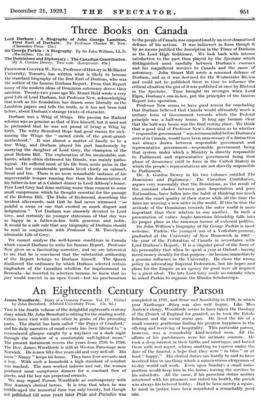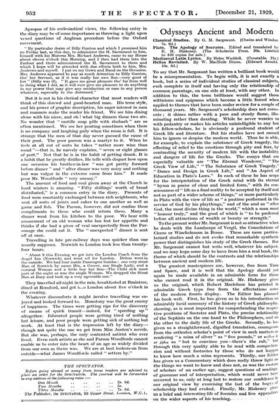An Eighteenth Century Country Parson
James Woodforde. Diary of a Country Parson. Vol. IV. Edited by John Beresford. (Oxford University Press. 12s. 6d.) This is the fourth volume of the delightful eighteenth century diary which Mr. John Beresford is editing for the reading world. Critics have vied with each other in praise of the preceding parts. The diarist has been called " the Pepys of Cranford," and his daily narrative of small events has been likened to " a remembered glimpse caught by a wayfarer on a dark night through the window of a comfortable well-lighted room." The present instalment covers the years from 1793 to 1796. The Rev. James Woodforde is still at Weston Parsonage near Norwich. He is now fifty-five years old and very well off. His niece " Nancy " keeps his house. They have four servants and a boy. With such a household a high standard of comfort Was reached. The men worked indoors and out, the women produced most sumptuous dinners for a constant flow of guests, and the boy ran perpetual errands.
We may regard Parson Woodforde as contemporary with Miss Austen's clerical heroes. It is true that when he was middle-aged the immortal Jane was only twenty, but though not published till some years later Pride and Prejudice was completed in 1797, and Sense and Sensibility in 1798, in which year Norlhanger Abbey was also well begun. Like Miss Austen's clergy, Woodforde seems to have taken the theology of the Church of England for granted, as he took the Estab- lishment and the social status quo. He lived the life of a small country gentleman finding his greatest happiness in the offering and receiving of hospitality. This particular parson, however, was a remarkably kind-hearted man. All the affairs of his parishioners were his intimate concern. He took a deep interest in their births and marriages, and buried them with real regret, seldom omitting to express under the date of the funeral, a hope that they were " in bliss " or at least " happy." His clerical duties can hardly be said to have involved him in anything which a conscientious clergyman of to-day would call work. Even upon Sundays a small indis- position would keep him in the house, leaving the services to his substitute. All the same, if his parochial duties neither interfered with his pleasures nor risked his health, the parish was always his beloved hobby. Had he been merely a squire, he must in justice have been considered a remarkably good one.
Apropos of his ecclesiastical views, the following entry in the diary may be of some importance as throwing a light upon vexed questions of Anglican procedure before the Oxford movement.
" By particular desire of Billy Gunton and which I promised him on Friday last, as this day, to administer the H. Sacrament to him, himself with his Mistress Mrs. Michael Andrews, came to thy House about eleven o'clock this Morning, and I then had them into the Parlour and there administered the H. Sacrament to them and which I hope will be attended with due effects both to him, Mrs. Andrews and myself. I put on my Gown and Band on the Occasion. Mrs. Andrews appeared to pay as much Attention to Billy Gunton, tho' her Servant, as if it was really her own Son—very good of her " (Billy was ill). " It gave me groat pleasure tho' far from well in doing what I did, as it will ever give me pleasure to do anything in my power that may give any satisfaction or ease to any person whatever, especially to the distressed."
But it is not in his clerical character that most readers will think of this shrewd and good-hearted man. His terse style,
and his power of graphic description, his eager interest in men and manners make the reader his friend. We see him dining
alone with his niece, and oh ! what big dinners those two ate. No wonder that " castille soap pills with rhubarb " are so often mentioned. We see her pouting sometimes when there is no company and laughing gaily when the room is full. It is strange that the men of that day never guessed the cause of their gout. The poor parson was a martyr to it. When lie feels at all out of sorts he takes " rather more wine than usual "—that is, he naively explains, " seven or eight glasses of port." Not that he is in the habit of getting drunk. It is a habit that he greatly dislikes. He tells with disgust how upon one occasion his brother-in-law " was got pretty forward before dinner " and " after dinner was very noisy and nothing but was vulgar in the extreme came from him." It made poor Mr. Woodforde " very uneasy."
The amount of food and coal given away at the Church in hard winters is amazing. " Fifty shillings' worth of bread distributed," is a common entry in the diary. Presents of food were constantly exchanged between rich neighbours, who sent all sorts of joints and cakes to one another as well as game and fish. The Parson, however, did not confine these compliments to those who could return them. Many a dinner went from his kitchen to the poor. We hear with amusement of an old woman who has lost her appetite and thinks if she had a piece of veal unexpectedly from the Par- sonage she could eat it. The " unexpected " dinner is sent off at once.
Travelling in late pre-railway days was quicker than one usually supposes. Norwich to London took less than twenty- four hours.
" About 9 this Evening we got into the London Coach from the Angel Inn (Norwich) and went off for London. Briton went in the outside. We had four inside Passengers besides : one very stout Man of Norwich by name Rix, a Grocer, one Single Lady, and a comical Woman and a little boy her Son—The Child sick most part of the night as was the single Woman. We dropped the Stout Man at Bury and took up a very agreeable one."
They travelled all night in the rain, breakfasted at Braintree,
dined at Romford, and got London about five o'clock in the evening.
Whatever discomforts it might involve travelling was en- joyed and looked forward to. Monotony was the great enemy of happiness. The times were getting ripe for the discovery of means of quick transit—indeed, for " speeding up " altogether. Educated people were getting tired of nothing but leisure, and poor people were getting sick of nothing but work. At least that is the impression left by the diary— though not quite the one we get from Miss Austen's novels. But she was, perhaps, the only contented satirist who ever lived. Even such artists as she and Parson Woodforde cannot
enable us to enter into the heart of an age so widely divided from our own as theirs was.. We are at best lookers-on from
outside—what James Woodforde called "setters by."



































 Previous page
Previous page